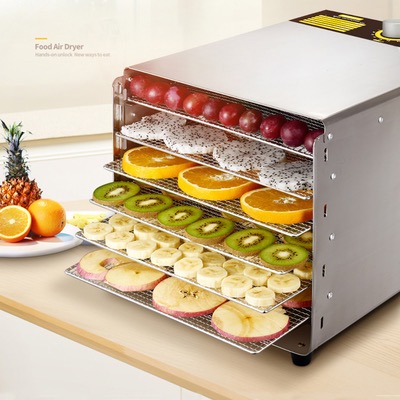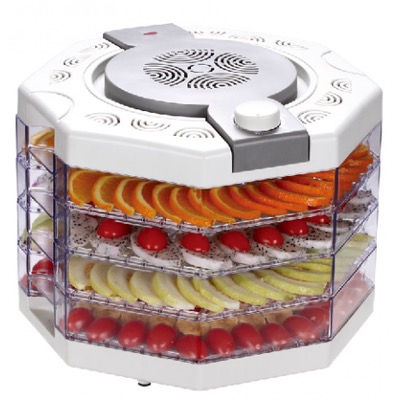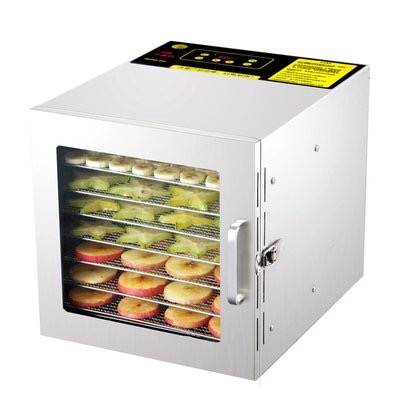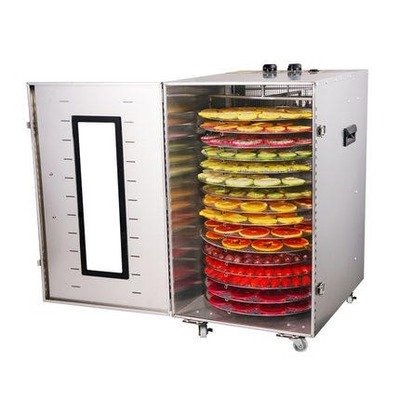
Content Menu
● Introduction
● Understanding the Basics of Fruit Dehydration
● Types of Dryer Fruit Drying Machines
>> 1. Electric Fruit Dehydrator
>> 2. Commercial Fruit Drying Equipment
>> 3. Industrial Fruit Dryer
● Key Features of Modern Dryer Fruit Drying Machines
>> 1. Multi-Tray Food Dehydrator Design
>> 2. Digital Controls and Preset Programs
>> 3. Energy-Efficient Operation
>> 4. Stainless Steel Construction
● Choosing the Right Dryer Fruit Drying Machine
● Tips for Using Your Dryer Fruit Drying Machine
● Creative Applications for Your Dried Fruits
● The Benefits of Using a Dryer Fruit Drying Machine
● Maintenance and Care of Your Fruit Drying Machine
● Innovations in Fruit Drying Technology
● Commercial Applications of Fruit Drying Machines
● Environmental Impact of Fruit Drying
● Conclusion
● Frequently Asked Questions
>> Q1: How long does it take to dry fruits in a dryer fruit drying machine?
>> Q2: Can I use my dryer fruit drying machine for other foods?
>> Q3: How do I clean and maintain my dryer fruit drying machine?
>> Q4: Is it safe to leave my dryer fruit drying machine running overnight?
>> Q5: How long can I store fruits dried in my dryer fruit drying machine?
Introduction
In today's world of health-conscious living and sustainable food practices, the dryer fruit drying machine has become an indispensable tool for both home enthusiasts and commercial food producers. This comprehensive guide will explore the world of fruit dehydrators, from compact home appliances to industrial-scale equipment, highlighting their benefits, features, and the transformative impact they can have on your culinary adventures and food preservation efforts.
Understanding the Basics of Fruit Dehydration
Before delving into the specifics of dryer fruit drying machines, it's crucial to understand the science behind fruit dehydration. The process involves removing moisture from fruits to inhibit the growth of bacteria, yeast, and mold, thereby extending their shelf life. This ancient preservation technique not only helps reduce food waste but also concentrates flavors and nutrients, making dried fruits a nutritious and convenient snack option.

Types of Dryer Fruit Drying Machines
1. Electric Fruit Dehydrator
The electric fruit dehydrator is perhaps the most common type of dryer fruit drying machine for home use. These appliances use electric heating elements and fans to circulate warm air over the fruit, ensuring even drying regardless of ambient conditions.
Benefits of electric fruit dehydrators include:
- Consistent results
- Faster drying times
- Can be used indoors
- Suitable for all climates
2. Commercial Fruit Drying Equipment
For larger-scale operations, commercial fruit drying equipment offers increased capacity and efficiency. These machines are designed to handle larger volumes of fruit and often feature more advanced controls for precise temperature and humidity regulation.
Advantages of commercial fruit drying equipment:
- High capacity
- Precise control over drying conditions
- Faster processing times
- Suitable for a wide range of fruits and vegetables
3. Industrial Fruit Dryer
Industrial fruit dryers are the largest and most sophisticated dryer fruit drying machines available. These systems are designed for continuous operation and can process tons of fruit per day. They often incorporate advanced features such as multi-stage drying, automated loading and unloading, and integrated quality control systems.
Key Features of Modern Dryer Fruit Drying Machines
1. Multi-Tray Food Dehydrator Design
Most modern dryer fruit drying machines feature a multi-tray design, allowing users to dry different types of fruits simultaneously or large batches of a single fruit type. This design maximizes efficiency and space utilization.
2. Digital Controls and Preset Programs
Digital fruit dehydrators offer precise control over temperature and drying time. Many models come with preset programs for different types of fruits, taking the guesswork out of the drying process.
3. Energy-Efficient Operation
As energy conservation becomes increasingly important, manufacturers are developing energy-efficient fruit dryers that minimize power consumption without compromising on performance.
4. Stainless Steel Construction
High-quality dryer fruit drying machines often feature stainless steel construction, ensuring durability, easy cleaning, and resistance to corrosion.
Choosing the Right Dryer Fruit Drying Machine
Selecting the perfect fruit drying machine depends on several factors:
1. Capacity: Consider how much fruit you plan to dry regularly.
2. Available space: Compact fruit drying appliances are ideal for small kitchens, while larger units may require dedicated space.
3. Energy efficiency: Look for models with good energy ratings to minimize operating costs.
4. Features: Decide which features are essential for your needs, such as digital controls or preset programs.
5. Budget: Prices can vary significantly from basic home models to industrial-grade equipment.

Tips for Using Your Dryer Fruit Drying Machine
To get the most out of your fruit dehydrator, follow these tips:
1. Prepare fruits properly: Wash and slice fruits evenly to ensure consistent drying.
2. Pre-treat when necessary: Some fruits benefit from pre-treatment with lemon juice or ascorbic acid to prevent browning.
3. Arrange fruits in a single layer: Avoid overcrowding to allow for proper air circulation.
4. Rotate trays: If your dryer doesn't have a fan, rotate trays periodically for even drying.
5. Check for doneness: Fruits should be pliable but not sticky when properly dried.
6. Store correctly: Once dried, store fruits in airtight containers in a cool, dark place.
Creative Applications for Your Dried Fruits
Your dryer fruit drying machine opens up a world of culinary possibilities. Here are some creative ways to use your dried fruits:
1. Homemade trail mix: Combine dried fruits with nuts and seeds for a healthy snack.
2. Fruit-infused teas: Add dried fruits to loose-leaf teas for unique flavor combinations.
3. Baked goods: Incorporate dried fruits into muffins, cookies, and bread for added texture and flavor.
4. Fruit powders: Grind dried fruits into powders for use in smoothies or as natural food coloring.
5. Fruit leather: Blend and dry pureed fruits for a chewy, portable snack.
The Benefits of Using a Dryer Fruit Drying Machine
Investing in a quality fruit dehydrator offers numerous advantages:
1. Cost-effective: Save money on store-bought dried fruits and reduce food waste.
2. Customization: Control the drying process and experiment with different fruits and flavors.
3. Healthier snacks: Avoid added sugars and preservatives found in commercial dried fruits.
4. Sustainable living: Reduce your carbon footprint by preserving local, seasonal produce.
5. Versatility: Use your dryer for various foods beyond fruits, including vegetables and herbs.
Maintenance and Care of Your Fruit Drying Machine
Proper maintenance ensures the longevity and efficiency of your dryer fruit drying machine:
1. Regular cleaning: Clean trays and the interior after each use with mild soap and water.
2. Inspect components: Regularly check fans, heating elements, and seals for wear or damage.
3. Proper storage: Store your dehydrator in a clean, dry place when not in use.
4. Follow manufacturer guidelines: Adhere to the care instructions provided by the manufacturer.
Innovations in Fruit Drying Technology
The field of fruit dehydration continues to evolve, with new technologies emerging:
1. Smart connectivity: Some models now offer smartphone connectivity for remote monitoring and control.
2. Improved energy efficiency: Newer models incorporate advanced insulation and heat recovery systems.
3. Hybrid solar-electric systems: Combining solar power with electric backup for eco-friendly operation.
4. Advanced sensors: Precision moisture and temperature sensors for optimal drying results.
Commercial Applications of Fruit Drying Machines
Beyond home use, dryer fruit drying machines play a crucial role in various industries:
1. Food manufacturing: Production of dried fruit snacks, ingredients for cereals, and baking mixes.
2. Agriculture: Preserving surplus harvests and creating value-added products.
3. Nutraceuticals: Producing fruit powders for supplements and functional foods.
4. Gourmet food sector: Creating high-end dried fruit products for specialty markets.
Environmental Impact of Fruit Drying
Using a dryer fruit drying machine can have positive environmental effects:
1. Reduced food waste: Extend the life of fruits that might otherwise spoil.
2. Lower transportation emissions: Dried fruits are lighter and more compact to transport.
3. Seasonal eating: Preserve local, seasonal fruits for year-round consumption.
4. Energy efficiency: Modern dehydrators use less energy compared to other preservation methods.
Conclusion
The dryer fruit drying machine is more than just an appliance; it's a gateway to a more sustainable, healthy, and creative approach to food. Whether you're a home enthusiast looking to preserve your garden's bounty or a commercial producer seeking to expand your product line, fruit dehydrators offer endless possibilities. By understanding the types, features, and applications of these machines, you can make informed decisions about incorporating fruit drying into your lifestyle or business. Embrace the world of dehydration and discover the delicious, nutritious potential of dried fruits.

Frequently Asked Questions
Q1: How long does it take to dry fruits in a dryer fruit drying machine?
A1: Drying times can vary depending on the type of fruit, its water content, and the efficiency of your dryer. Generally, most fruits take between 6 to 36 hours to dry completely. Berries and thin-sliced apples might dry in 6-12 hours, while denser fruits like pears or peaches can take 24-36 hours. It's important to check your fruits regularly and adjust drying times as needed.
Q2: Can I use my dryer fruit drying machine for other foods?
A2: Absolutely! While designed primarily for fruits, most food dehydrators can be used for a variety of foods. Vegetables, herbs, and even meats (for jerky) can be dried using the same machine. Just be sure to adjust temperatures and drying times accordingly, and always follow proper food safety guidelines, especially when drying meats.
Q3: How do I clean and maintain my dryer fruit drying machine?
A3: Regular cleaning and maintenance are crucial for the longevity and efficiency of your dryer. After each use, wipe down trays and the interior with a mild soap solution and dry thoroughly. Periodically check and clean fans and vents to ensure proper air circulation. For units with removable parts, these can often be washed in a dishwasher. Always unplug the machine before cleaning and ensure everything is completely dry before the next use.
Q4: Is it safe to leave my dryer fruit drying machine running overnight?
A4: Most modern dryer fruit drying machines are designed for continuous operation and are safe to run overnight. However, it's always advisable to follow the manufacturer's instructions. Ensure the machine is placed in a well-ventilated area away from flammable materials. Some users prefer to use their dryers when they can monitor them, especially for first-time use. Many models come with automatic shut-off features for added safety.
Q5: How long can I store fruits dried in my dryer fruit drying machine?
A5: Properly dried and stored fruits can last for several months to a year. The key is to ensure they are completely dry and stored in airtight containers in a cool, dark place. Vacuum sealing can extend shelf life even further. Always check for any signs of mold or unusual odors before consuming stored dried fruits. For best quality and nutritional value, it's recommended to use dried fruits within 6-12 months.












